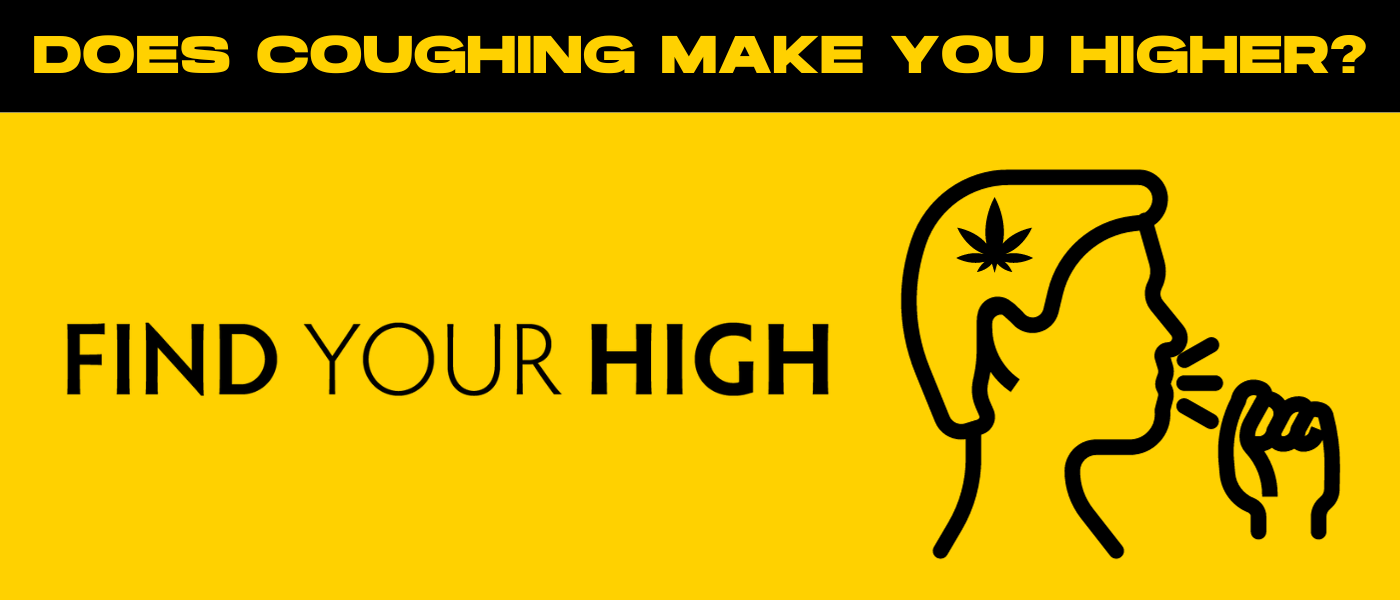Many stoners believe that coughing after inhaling cannabis intensifies the high, while skeptics argue it’s just a placebo effect. So, we set out to explore the age-old question: Does coughing make you higher?
This has sparked passionate debates in the cannabis community! But we’re here to clear up the confusion and provide accurate info on the effects of cannabis and coughing.
In this blog, we’ll dive deeper into this theory, exploring scientific studies and personal experiences to find out if coughing truly enhances the therapeutic effects of cannabis-induced euphoria. Let’s begin!
Does Coughing Make You Higher?
The popular belief that coughing up marijuana smoke after smoking weed intensifies the high is ingrained in stoner folklore.
The theory suggests that the act of coughing expands the lungs, which in turn allows more THC (the psychoactive component in weed) to be absorbed, leading to increased intoxication and a more potent high. This misconception, probably due to personal experiences, has spread like wildfire in the cannabis community and even in popular culture.
In fact, this belief is so widespread that it has become a part of stoner etiquette, with the saying “if you don’t cough, you don’t get off” being popularized in films, music, and media. However, as catchy as these phrases are, they may not hold up to scientific scrutiny.
As with many aspects of cannabis culture, it’s crucial to separate fact from fiction and anecdote from evidence because coughing is a natural response and to avoid coughing is to invite respiratory system issues into your life.

How Cannabis Affects the Body
Weed impacts the body through a series of interactions between its active compounds, known as cannabinoids, and specific receptors in our bodies. The two most well-known cannabinoids are delta-9-tetrahydrocannabinol (THC) and cannabidiol (CBD), but THCa, the non-psychoactive precursor to THC, also plays a role.
THC is the primary psychoactive compound responsible for the “high” users experience. It binds to cannabinoid receptors in the brain, affecting areas related to pleasure, memory, concentration, and time perception. THCa, while non-psychoactive in its raw form, can be converted into THC through decarboxylation, which then contributes to these effects.
CBD, on the other hand, is non-psychoactive and is believed to moderate the effects of THC. It interacts with different receptors and can balance out THC’s psychoactive effects, potentially reducing anxiety and improving overall well-being.
Different Methods of Cannabis Consumption
Cannabinoids can enter the body through various routes, each affecting the onset, intensity, and duration of the high.
Smoking cannabis flower or vaping allows immediate absorption into the bloodstream via the lungs, resulting in a rapid onset of effects. Edibles, on the other hand, are metabolized by the liver before entering the bloodstream, leading to a delayed but usually more potent high.
Coughing fits into this process in the case of smoking cannbis or vaping. When a stoner coughs, it’s typically because the smoke has irritated the airways. This irritation causes the airways to expand, theoretically allowing more cannabinoids to be absorbed.
However, any perceived intensification of the high may be due to a temporary lack of oxygen rather than an increased absorption of THC.
The relationship between coughing and the intensity of a cannabis high is quite complex and still requires more research for us to draw definitive conclusions.
Dispelling the Urban Myth
Let’s begin by taking a look at this popular myth from a scientific standpoint.
Despite what many believe, studies on cannabis consumption have shown that coughing after smoking marijuana doesn’t really enhance the high or create a more potent experience. In fact, a study published in the American Journal of Respiratory and Critical Care Medicine back in 1997 suggested that coughing during a smoke session could actually lead to bronchitis or other respiratory issues, instead of intensifying the high.
When it comes to THC absorption, it’s important to note that it happens almost instantly upon inhaling cannabis smoke or inhalation, so coughing doesn’t have much of an impact in that regard. Plus, coughing can be uncomfortable and disrupt the overall experience of using cannabis.
So, even though coughing might give you a momentary head-rush due to lack of oxygen, it doesn’t necessarily mean you’re getting higher.
Common Misunderstandings
When it comes to cannabis consumption, there are so many myths and misconceptions, with the ‘coughing makes you higher’ hypothesis being one of the most prevalent.
Another widespread misconception is the belief that holding in smoke after inhaling smoke from cannabis will increase the potency of the high. However, similar to the coughing theory, research shows that THC is absorbed almost immediately, rendering the ‘holding hot smoke in’ technique ineffective.
A misunderstanding of such theories not only contributes to the spread of misinformation but can also potentially harm the health and overall experience of cannabis users. This emphasizes the need for accurate and scientifically backed information in the cannabis community.
Ultimately, it’s essential to arm yourself with the right knowledge to make informed decisions and debunk any misleading myths effectively.

Risks and Benefits of Cannabis Consumption
The use of cannabis, like any other substance, comes with its set of potential risks and benefits. Understanding these can help consumers make informed decisions.
Potential Health Risks Associated with Cannabis
Weed use, particularly when heavy and chronic, can carry several health risks. Prolonged use can lead to cannabis use disorder, characterized by a strong desire to consume cannabis to the detriment of one’s health and lifestyle.
Smoking cannabis can also have negative effects on lung health, similar to tobacco use. Regular users may experience chronic cough, bronchitis, and an increased risk of respiratory infections, especially if they are prone to these medical conditions.
Additionally, cannabis can affect mental health. Some individuals, particularly those with a pre-existing susceptibility, may encounter an increased risk of developing mental health disorders such as schizophrenia and anxiety disorders.
The Therapeutic Effects of Cannabis
On the other hand, medical cannabis has shown potential in providing relief for several health conditions. Medical marijuana, which is primarily CBD-based, has been used to treat conditions like epilepsy, multiple sclerosis, and chronic pain.
The therapeutic potential of cannabis extends to mental health, with some studies suggesting its efficacy in managing symptoms of PTSD and anxiety disorders. However, more comprehensive and large-scale studies are necessary to further establish its effectiveness and safety.
It’s also worth mentioning the role of weed in palliative care. In some cases, it has been used to alleviate symptoms in patients with terminal illnesses, improving their quality of life.
In conclusion, while cannabis does have potential risks, it also offers several therapeutic benefits. As consumers and patients, it’s important to weigh these factors and consult with healthcare professionals when considering cannabis use.
Conclusion
Based on our discussion, it’s clear that the world of cannabis can be quite complex, with many myths and misconceptions surrounding it. However, it’s important to remember that coughing doesn’t actually enhance the high, and theories like ‘holding in smoke’ won’t intensify the effects of THC.
While regular and heavy cannabis use may have potential health risks, there are also notable therapeutic benefits for certain health conditions.
As we navigate through these complexities, it’s crucial for consumers to seek accurate, scientifically-backed information and question prevailing falsehoods.
Let’s aim for responsible cannabis use, being mindful of both its potential benefits and risks. Just like with any substance, moderation and informed decisions are key to ensuring a positive and safe experience.

Frequently Asked Questions
1. Can being high make you cough?
Being high itself does not cause you to cough. However, the method of consumption, such as smoking or vaping cannabis, can irritate your airways and cause you to cough. This is especially true after a sharp inhale.
The heat and smoke, along with various other plant material and particles, can trigger coughing as your body’s reflex to protect your lungs.
2. How many cigarettes equal one joint?
Comparing a cigarette to a joint is not straightforward, as they contain different substances—tobacco and weed, respectively.
However, in terms of potential harm to the lungs, a commonly cited study from New Zealand suggests that smoking one joint could be as harmful as 5 cigarettes.
This is largely due to the smoking technique used by cannabis smokers, which involves deeper inhalation and holding the cannabis smoke in the lungs longer, leading to greater tar deposition.
3. Does sativa make you cough more than indica?
There’s no concrete scientific evidence suggesting that one strain causes more coughing than another.
The coughing reflex is typically triggered by smoke irritation in the throat and lungs, which can occur regardless of whether you’re smoking sativa or indica.
However, different strains can have varying levels of THC and terpenes, which may cause different physical reactions among users.
4. How do you get rid of a bong lung?
“Bong lung” is a term referring to the respiratory issues that can arise from regularly smoking weed, particularly through a bong. To alleviate the symptoms, consider the following steps:
- Quit or Reduce Usage: The best way to get rid of bong lung is to quit or reduce cannabis smoking. This gives your lungs a chance to start healing.
- Switch to Alternatives: Consider using alternative methods that are less harmful to your lungs, like edibles or tinctures.
- Practice Good Hygiene: Keep your bong clean to prevent the buildup of mold and bacteria, which can exacerbate respiratory issues.
- Stay Hydrated and Maintain a Healthy Diet: Drinking plenty of water can help soothe an irritated throat and maintaining a healthy diet can boost your overall immune system.
- Exercise Regularly: Regular exercise can help improve your lung capacity and overall respiratory system health.
- Seek Medical Attention: If you’re experiencing persistent respiratory system issues, it’s crucial to seek medical advice.
5. Does weed affect memory?
Yes, weed can affect memory. Specifically, THC, the primary psychoactive compound in weed, can impair short-term memory.
This is because THC influences the hippocampus, a region of the brain responsible for forming new memories.
However, it’s worth noting that these effects are usually temporary and often recede as the intoxicating effects of THC wear off. Chronic use, however, might lead to more long-term memory issues.
As always, it is recommended to smoke weed responsibly and consult with a healthcare provider regarding any concerns.

 Rewards
Rewards




